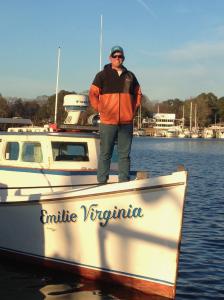Petyon Mayson

Young Fishermen in the Northeast United States
Interviews with 39 fishers between the ages of 18-35, located along the US East Coast from Maine to North Carolina. Collectively, they represent a wide variety of gear types and fisheries. All had been fishing full-time for at least two years and wanted to make fishing their career. They describe motivations for choosing a fishing career, strategies used, barriers encountered, and facilitating factors that have enabled interviewees to defy the graying trend to become successful fishermen.
Please visit the Voices SoundCloud page to explore clips and stories that relate to this collection.
Sarah Schumann
Peyton Mason, 23 years old at the time of his interivew, is an oyster and crab fisherman in Deep Creek, VA. Peyton didn't grow up fishing, but fell in love with it in 8th grade after watching other fishermen come in with their catch. It was not long before he obtained a waterman license, began harvesting oysters and crabs, and eventually built his way up to owning the F/V Emilie Virginia, a Chesapeake deadrise. But his ambitions don't stop there; Peyton has done stints on shrimping and scalloping boats to get exposure to fisheries in other areas, too.
Scope and Content Note
In this interview, Peyton Mason discusses various aspects of his experience as a young fisherman in Virginia. Peyton talks about his educational background, including studying business management at Virginia Commonwealth University while continuing his fishing career. He also shares his aspirations to expand into other fisheries and potentially own larger boats for groundfishing or shrimping. Peyton discusses the age demographics in the fishing community and the knowledge transfer from older, experienced fishermen to younger generations. Peyton also mentions his pursuit of a business management degree to add credibility and improve his ability to conduct business in the fishing industry. He shares insights into the challenges of adapting to market changes and the importance of having backup plans in the fishing business.
Although he is self-taught, Peyton gives thanks for what he's learned from other fishermen: “I’ve really enjoyed the knowledge that the older folks are willing to pass on... It’s amazing how much you learn just sitting around the dock and talking. Fishing can never be just a nine to five job, when you leave the dock you just go home, or when you get on the boat and get off the boat. There’s so much networking. There’s so much that you learn about what the tide’s doing. The guys that are older than me, they’ve got forty years of experience, plus they’ve got the forty years of experience of people who taught them, so they know so much. You don’t learn it all overnight, but I think that’s what makes our fishery special is you have to be passionate about it. You have to spend your weekends learning and talking about it. That’s what makes you successful. You don’t just pick it up and put it down. It kind of runs through you.”
Please Note: The oral histories in this collection are protected by copyright and have been created for educational, research and personal use as described by the Fair Use Doctrine in the U.S. Copyright law. Please reach out Voices@noaa.gov to let us know how these interviews are being used in your research, project, exhibit, etc. The Voices staff can help provide other useful resources related to your inquiry.
The NOAA mission is to understand and predict changes in climate, weather, oceans, and coasts, to share that knowledge and information with others, and to conserve and manage coastal and marine ecosystems and resources. The Voices Oral History Archives offers public access to a wide range of accounts, including historical materials that are products of their particular times, and may contain offensive language or negative stereotypes.
Voices Oral History Archives does not verify the accuracy of materials submitted to us. The opinions expressed in the interviews are those of the interviewee only. The interviews here have been made available to the public only after the interviewer has confirmed that they have obtained consent.
